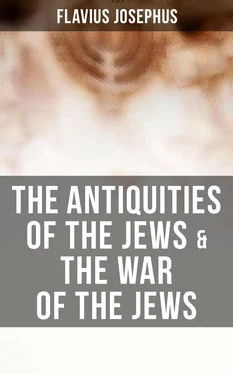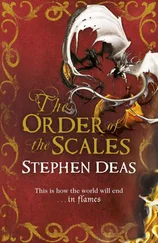3. When Abraham heard this, he was grieved for the Sodomites; and he rose up, and besought God for them, and entreated him that he would not destroy the righteous with the wicked. And when God had replied that there was no good man among the Sodomites; for if there were but ten such man among them, he would not punish any of them for their sins, Abraham held his peace. And the angels came to the city of the Sodomites, and Lot entreated them to accept of a lodging with him; for he was a very generous and hospitable man, and one that had learned to imitate the goodness of Abraham. Now when the Sodomites saw the young men to be of beautiful countenances, and this to an extraordinary degree, and that they took up their lodgings with Lot, they resolved themselves to enjoy these beautiful boys by force and violence; and when Lot exhorted them to sobriety, and not to offer any thing immodest to the strangers, but to have regard to their lodging in his house; and promised that if their inclinations could not be governed, he would expose his daughters to their lust, instead of these strangers; neither thus were they made ashamed.
4. But God was much displeased at their impudent behavior, so that he both smote those men with blindness, and condemned the Sodomites to universal destruction. But Lot, upon God's informing him of the future destruction of the Sodomites, went away, taking with him his wife and daughters, who were two, and still virgins; for those that were betrothed 1to them were above the thoughts of going, and deemed that Lot's words were trifling. God then cast a thunderbolt upon the city, and set it on fire, with its inhabitants; and laid waste the country with the like burning, as I formerly said when I wrote the Jewish War. 2But Lot's wife continually turning back to view the city as she went from it, and being too nicely inquisitive what would become of it, although God had forbidden her so to do, was changed into a pillar of salt; 3for I have seen it, and it remains at this day. Now he and his daughters fled to a certain small place, encompassed with the fire, and settled in it: it is to this day called Zoar, for that is the word which the Hebrews use for a small thing. There it was that he lived a miserable life, on account of his having no company, and his want of provisions.
5. But his daughters, thinking that all mankind were destroyed, approached to their father, 4though taking care not to be perceived. This they did, that human kind might not utterly fail: and they bare sons; the son of the elder was named Moab, Which denotes one derived from his father; the younger bare Ammon, which name denotes one derived from a kinsman. The former of whom was the father of the Moabites, which is even still a great nation; the latter was the father of the Ammonites; and both of them are inhabitants of Celesyria. And such was the departure of Lot from among the Sodomites.
1These sons-in-law to Lot, as they are called, Genesis 19:12-14, might be so styled, because they were betrothed to Lot's daughters, though not yet married to them. See the note on Antiq. B. XIV. ch. 13. sect. 1.
2Of the War, B. IV. ch. 8. sect. 4.
3This pillar of salt was, we see here, standing in the days of Josephus, and he had seen it. That it was standing then is also attested by Clement of Rome, contemporary with Josephus; as also that it was so in the next century, is attested by Irenaeus, with the addition of an hypothesis, how it came to last so long, with all its members entire. — Whether the account that some modern travelers give be true, that it is still standing, I do not know. Its remote situation, at the most southern point of the Sea of Sodom, in the wild and dangerous deserts of Arabia, makes it exceeding difficult for inquisitive travelers to examine the place; and for common reports of country people, at a distance, they are not very satisfactory. In the mean time, I have no opinion of Le Clerc's dissertation or hypothesis about this question, which can only be determined by eye-witnesses. When Christian princes, so called, lay aside their foolish and unchristian wars and quarrels, and send a body of fit persons to travel over the east, and bring us faithful accounts of all ancient monuments, and procure us copies of all ancient records, at present lost among us, we may hope for full satisfaction in such inquiries; but hardly before.
4I see no proper wicked intention in these daughters of Lot, when in a case which appeared to them of unavoidable necessity, they procured themselves to be with child by their father. Without such an unavoidable necessity, incest is a horrid crime; but whether in such a case of necessity, as they apprehended this to be, according to Josephus, it was any such crime, I am not satisfied. In the mean time, their making their father drunk, and their solicitous concealment of what they did from him, shows that they despaired of persuading him to an action which, at the best, could not but be very suspicious and shocking to so good a man.
CHAPTER 12
Concerning Abimelech; And Concerning Ismael The Son Of Abraham; And Concerning The Arabians, Who Were His Posterity
Table of Contents
1. Abraham now removed to Gerar of Palestine, leading Sarah along with him, under the notion of his sister, using the like dissimulation that he had used before, and this out of fear: for he was afraid of Abimelech, the king of that country, who did also himself fall in love with Sarah, and was disposed to corrupt her; but he was restrained from satisfying his lust by a dangerous distemper which befell him from God. Now when his physicians despaired of curing him, he fell asleep, and saw a dream, warning him not to abuse the stranger's wife; and when he recovered, he told his friends that God had inflicted that disease upon him, by way of punishment, for his injury to the stranger; and in order to preserve the chastity of his wife, for that she did not accompany him as his sister, but as his legitimate wife; and that God had promised to be gracious to him for the time to come, if this person be once secure of his wife's chastity. When he had said this, by the advice of his friends, he sent for Abraham, and bid him not to be concerned about his wife, or fear the corruption of her chastity; for that God took care of him, and that it was by his providence that he received his wife again, without her suffering any abuse. And he appealed to God, and to his wife's conscience; and said that he had not any inclination at first to enjoy her, if he had known she was his wife; but since, said he, thou leddest her about as thy sister, I was guilty of no offense. He also entreated him to be at peace with him, and to make God propitious to him; and that if he thought fit to continue with him, he should have what he wanted in abundance; but that if he designed to go away, he should be honorably conducted, and have whatsoever supply he wanted when he came thither. Upon his saying this, Abraham told him that his pretense of kindred to his wife was no lie, because she was his brother's daughter; and that he did not think himself safe in his travels abroad, without this sort of dissimulation; and that he was not the cause of his distemper, but was only solicitous for his own safety: he said also, that he was ready to stay with him. Whereupon Abimelech assigned him land and money; and they coventanted to live together without guile, and took an oath at a certain well called Beersheba, which may be interpreted, The Well of the Oath: and so it is named by the people of the country unto this day.
2. Now in a little time Abraham had a son by Sarah, as God had foretold to him, whom he named Isaac, which signifies Laughter. And indeed they so called him, because Sarah laughed when God 1said that she should bear a son, she not expecting such a thing, as being past the age of child-bearing, for she was ninety years old, and Abraham a hundred; so that this son was born to them both in the last year of each of those decimal numbers. And they circumcised him upon the eighth day and from that time the Jews continue the custom of circumcising their sons within that number of days. But as for the Arabians, they circumcise after the thirteenth year, because Ismael, the founder of their nation, who was born to Abraham of the concubine, was circumcised at that age; concerning whom I will presently give a particular account, with great exactness.
Читать дальше












